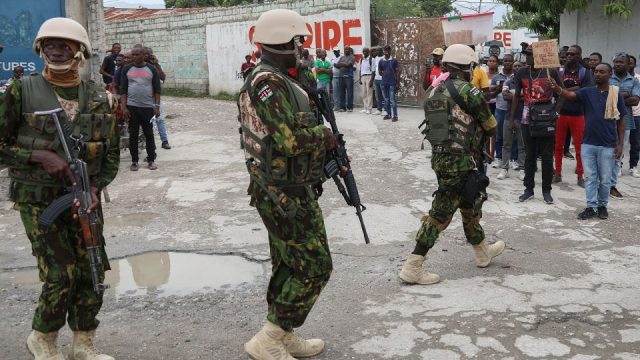A new report has shown that Kenyan police officers stationed in Haiti receive a monthly allowance of Ksh 295,000 in addition to their regular salaries.
This comes in the context of increasing dissatisfaction regarding delays in payment and shortages of equipment, which have negatively impacted the morale of the officers deployed in the Caribbean nation. READ FULL STORY
According to a local publication, the Kenyan police officers in Haiti have received their allowance for July, while the payment for August remains pending.
“We have received the one-month allowance and we have been informed that they will pay the other soon,” a source said.
Each individual from the initial contingent that was deployed on June 25 has received a payment of Ksh 295,000, while each officer from the second group that arrived in Haiti on July 17 has been compensated with Ksh 94,000.
According to the agreement with the Kenyan government, each police officer is entitled to a daily rate of $70, which amounts to $2,100 per month (Ksh 273,000).
The officers are currently engaged in peacekeeping operations in the Caribbean nation as part of a Multinational Security Support Mission (MSS) and have also acquired additional military equipment to enhance their efforts against armed gangs.
In July, U.S. Secretary of State Antony Blinken authorized the allocation of $109 million (Ksh 14.1 billion) to support the United Nations-backed initiative.
However, in August, the families of the Kenyan officers stationed in Haiti expressed concerns regarding their financial situation, as the officers had not yet received their mission allowances.
A contingent of Kenyan police officers was deployed to Haiti as part of a United Nations-backed mission aimed at combating rampant gang violence.
The first group of approximately 400 officers arrived in Port-au-Prince on June 25, 2024, amid a humanitarian crisis where gangs control over 80% of the city, contributing to widespread displacement and food insecurity.
Haitian Prime Minister Garry Conille emphasized the mission’s importance in restoring order and security, stating it marks a new era for the country.
He highlighted the dire situation, with armed groups holding the population hostage.
The mission is expected to grow to around 2,500 personnel, including contributions from other countries, with a projected annual cost of $600 million.







